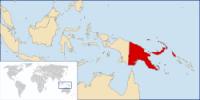|
|
|
Papua New Guinea (Tok Pisin: Papua Niugini) (PNG), officially the Independent State of Papua New Guinea, is a country in Oceania, occupying the eastern half of the island of New Guinea and numerous offshore islands (the western portion of the island is a part of the Indonesian provinces of Papua and West Papua). It is located in the southwestern Pacific Ocean, in a region defined since the early 19th century as Melanesia. The capital is Port Moresby. Papua New Guinea is one of the most culturally diverse countries on Earth, with over 850 indigenous languages and at least as many traditional societies, out of a population of just under seven million. It is also one of the most rural, as only 18% of its people live in urban centres. The country is one of the world's least explored, culturally and geographically, and many undiscovered species of plants and animals are thought to exist in the interior of Papua New Guinea. The majority of the population live in traditional societies and practise subsistence-based agriculture. These societies and clans have some explicit acknowledgement within the nation's constitutional framework. The PNG Constitution (Preamble 5(4)) expresses the wish for "traditional villages and communities to remain as viable units of Papua New Guinean society", and for active steps to be taken in their preservation. After being ruled by three external powers since 1884, Papua New Guinea gained its independence from Australia in 1975. It remains a Commonwealth realm of Her Majesty Elizabeth II, Queen of Papua New Guinea. Many people live in extreme poverty, with about one third of the population living on less than US$1.25 per day. |




 RSS
RSS